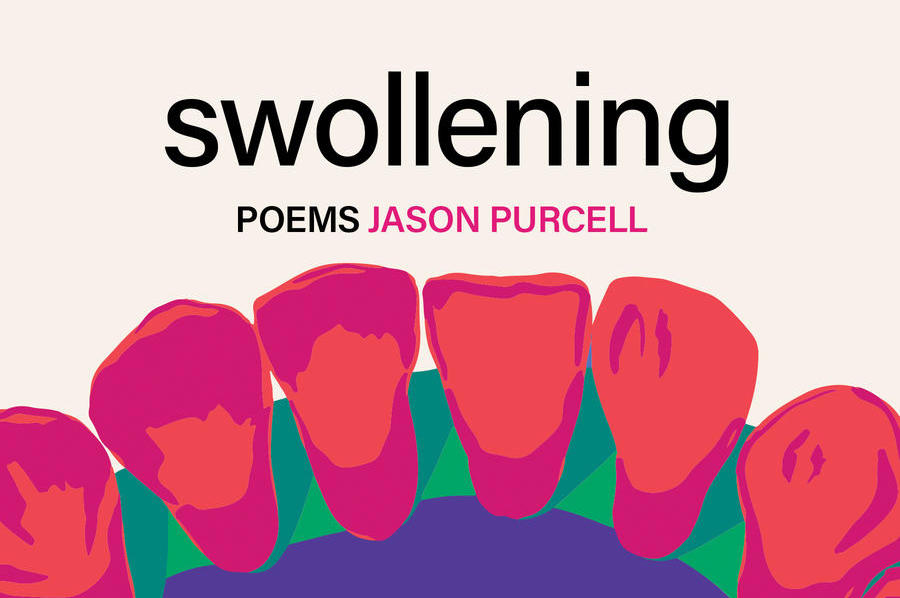
Swollening
Jason Purcell
Arsenal Pulp Press, 2022
Review by Catherine Harris
Jason Purcell’s Swollening begins in childhood, where the microbial landscape of the body is formed. In “Bathing” the speaker says, “For years / could not say the word I—could not / admit to being in a body.” In exploring the body’s response to cultural and environmental illness, to the effect of internalized homophobia on the gut, Purcell’s collection moves from acidic sickness towards healing, from queerness “locked inside the body” (“On Acicular Ice”) to queerness in the garden. At times this collection is starkly funny, while also being brutally compassionate; Swollening is as visceral and complex an experience as the ones it explores.
In the collection’s first section, titled “Things swallowed,” experiences settle in the stomach. Moving from a relationship steeped in power imbalances to the relationship between mother and son, these poems explore the inhospitable nature of fear, “fear of / being watched, disciplined.” The homophobia the speaker has internalized lives inside them; while bathing with their boyfriend, “It occurs to [them] now how bathing / with [their] boyfriend wrung [them] like a sponge, [their] anxiety / filming the top of the water.” However fraught with fear, this poem, “Simon and Vallier in the Tub,” is a moment of proximity between bodies before the collection’s middle section, where the speaker is isolated by pain.
In “Sickness is not a metaphor,” the effects of internalized homophobia, anxiety, and violence, express themselves in the mouth—what was swallowed rises to the surface. For example, in “Cvetkovich’s Teeth,” Purcell writes: “My joy dissolves in a pool of stomach acid / that has thinned me, my teeth soft and detached, / and I can only just keep myself from falling out.” Homophobia has started to break down the teeth and rot the gut. Reflecting on the men they grew up around, the speaker rememers them as “homophobic in trucks swallowing spit.” The speaker recalls how,
When I was a teenager I let them
disembody me internalizing everything
through the mouth and now my stomach
wants it out.
(“Men in the Gut”)
The connection between the body and heteronormativity is mirrored in ecological decay around the speaker. The third and final section, titled “If I had a window, it would be open,” acts as a portal between the inside and the out, allowing climate change to be in conversation with physical illness. In “The smoke,” Purcell captures lungs in crisis, suffocated by the fires that plague western Canada as climate change intensifies. These lungs are under threat from disease as well—COVID-19 looms at the margins. The speaker warns, “You have to be careful. There are / no hospital beds left in Alberta.” In these poems, the Earth is a body, “the sky’s collapsed / lungs wheezing, hot heavy heat wave air” (“A list of symptoms”).
This final section, however, also ushers in fresh air. In a suite of poems centred around a friend, Emily, the speaker explores queer friendship as healing. These poems, which include “Ceramics with Emily” and “Sourdough with Emily,” dig their fingers into making, beginning with clay and moving on to bread, a food with a living body of its own. Food becomes a way of repairing the gut for the speaker, a vessel for good bacteria—the body, in previous poems acidic and inhospitable, is influenced by the queer bodies and found family that surround it: “Becoming a family. Break bread, share bacteria, / where I reciprocate care for you, / love on gut-level” (“Sourdough with Emily”).
Nowhere does this culminate more beautifully than in the collection’s final poem, “in the garden with my faggots.” Surrounded by a queer family, by a garden full of fresh vegetables, the speaker is learning to “return to the comfort of proximity to bodies, of belonging / to bodies.” It is these queer friends “who teach me to laugh with each of my teeth…who i sit with / and nourish myself with what we’ve grown.” It is not always easy to offer hope, but by chronicling their own healing, Purcell does just that.
Catherine Harris holds a BA in English from the University of Bristol. She lives in Vancouver with her dog, who likes to keep her company while she’s writing.